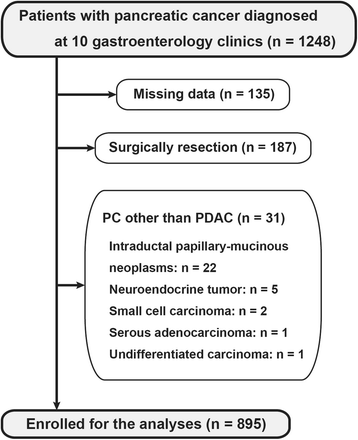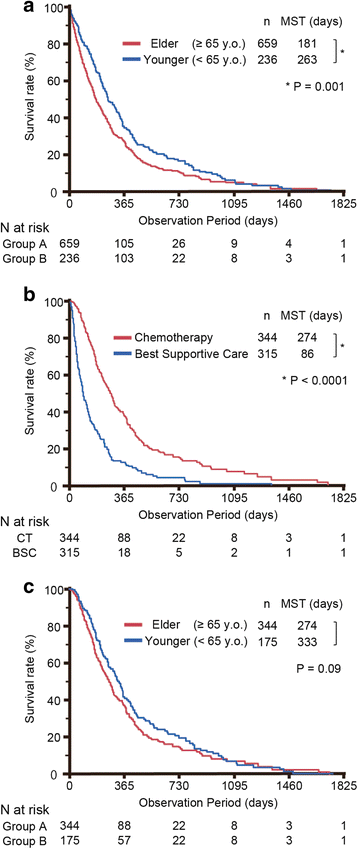Efficacy of chemotherapy in elderly patients with unresectable pancreatic cancer: a multicenter review of 895 patients
- PMID: 28532457
- PMCID: PMC5440997
- DOI: 10.1186/s12876-017-0623-8
Efficacy of chemotherapy in elderly patients with unresectable pancreatic cancer: a multicenter review of 895 patients
Abstract
Background: The efficacy of chemotherapy for unresectable pancreatic cancer has improved. However, it is occasionally difficult to make treatment decisions for elderly patients. We reviewed the outcomes of elderly patients with unresectable pancreatic cancer by using a large cohort and evaluated whether they had received chemotherapy and the reason why.
Methods: Data for 895 pancreatic cancer patients who were treated using chemotherapy or best supportive care were analyzed considering demographics, clinical stage, treatment, and outcome. Data were analyzed using the chi-square test, Student t-test, or Mann-Whitney U-test, as appropriate. Outcomes were analyzed using the Kaplan-Meier method. Differences in survival were analyzed using the log-rank test.
Results: The median survival time was significantly shorter in elderly patients (≥65 years) than in younger patients (<65 years) (181 vs. 263 days, P = 0.0001). The median survival time of patients treated with chemotherapy was not significantly different between the elderly and the younger group (274 days vs. 333 days, P = 0.09), and nor was that of patients choosing best supportive care (84 days vs. 78 days, P = 0.83). These results held true even when the age cut-off between younger and elder patients was increased to 70, 75, and 80 years. Elderly patients treated with chemotherapy had a significantly longer median survival time than those choosing best supportive care (274 vs. 86 days, P < 0.0001); a significantly greater proportion of elderly patients chose best supportive care compared to younger patients (47.8 vs. 25.8%, P < 0.0001). The reason for choosing best supportive care was established in 261 elderly patients (82.9%); 133 (51.0%) met the eligibility criteria for chemotherapy, but of these, 78 (58.6%) were not informed about their disease. The treatment preferences of elderly patients were not always considered; they often received only best supportive care per family members preference (N = 65, 48.8%) or because the physician based their treatment decision only on the patient's age (N = 68, 51.1%).
Conclusions: Chemotherapy appears effective for elderly pancreatic cancer patients with unresectable disease, but treatment needs to be optimized to improve prognosis.
Keywords: Best supportive care; Chemotherapy; Elderly; Pancreatic cancer.
Figures


Similar articles
-
Improvement of long-term outcomes in pancreatic cancer and its associated factors within the gemcitabine era: a collaborative retrospective multicenter clinical review of 1,082 patients.BMC Gastroenterol. 2013 Aug 31;13:134. doi: 10.1186/1471-230X-13-134. BMC Gastroenterol. 2013. PMID: 24256464 Free PMC article.
-
Gemcitabine as first-line chemotherapy in elderly patients with unresectable pancreatic carcinoma.J Gastroenterol. 2010 Nov;45(11):1146-54. doi: 10.1007/s00535-010-0258-9. Epub 2010 Jun 15. J Gastroenterol. 2010. PMID: 20549255
-
Effect of low-dose gemcitabine on unresectable pancreatic cancer in elderly patients.Digestion. 2011;84(3):230-5. doi: 10.1159/000330384. Epub 2011 Aug 23. Digestion. 2011. PMID: 21860243
-
[How I treat ... An advanced pancreatic cancer].Rev Med Liege. 2002 Mar;57(3):131-4. Rev Med Liege. 2002. PMID: 12014258 Review. French.
-
Current options for palliative treatment in patients with pancreatic cancer.Dig Dis. 2001;19(1):63-75. doi: 10.1159/000050655. Dig Dis. 2001. PMID: 11385253 Review.
Cited by
-
Chemotherapy use and survival in older adults with metastatic pancreatic cancer in the combination therapy era.J Geriatr Oncol. 2020 May;11(4):640-646. doi: 10.1016/j.jgo.2019.12.013. Epub 2020 Jan 6. J Geriatr Oncol. 2020. PMID: 31917116 Free PMC article.
-
Postoperative and long-term survival in relation to life-expectancy after pancreatic surgery in elderly patients (cohort study).Ann Med Surg (Lond). 2021 Aug 15;69:102724. doi: 10.1016/j.amsu.2021.102724. eCollection 2021 Sep. Ann Med Surg (Lond). 2021. PMID: 34457257 Free PMC article.
-
Postoperative Course and Supportive Care in Very Elderly Cecum Cancer Patients.Cureus. 2024 Jun 7;16(6):e61919. doi: 10.7759/cureus.61919. eCollection 2024 Jun. Cureus. 2024. PMID: 38855493 Free PMC article.
-
Clinical features and prognostic factors of elderly patients with metastatic pancreatic cancer: a population-based study.Aging (Albany NY). 2021 Feb 26;13(5):7133-7146. doi: 10.18632/aging.202570. Epub 2021 Feb 26. Aging (Albany NY). 2021. PMID: 33639615 Free PMC article.
-
Characteristics and survival of older patients with metastatic pancreatic cancer: a retrospective analysis of the AC Camargo Cancer Center experience.Ther Adv Med Oncol. 2019 Sep 10;11:1758835919874650. doi: 10.1177/1758835919874650. eCollection 2019. Ther Adv Med Oncol. 2019. PMID: 31534492 Free PMC article.
References
-
- Kuroda T, Kumagi T, Yokota T, Seike H, Nishiyama M, Imai Y, et al., on behalf of the EPOCH Study Group. Improvement of long-term outcomes in pancreatic cancer and its associated factors within the gemcitabine era: a collaborative retrospective multicenter clinical review of 1,082 patients. BMC Gastroenterol. 2013;13:134. - PMC - PubMed
Publication types
MeSH terms
Substances
LinkOut - more resources
Full Text Sources
Other Literature Sources
Medical
Miscellaneous

